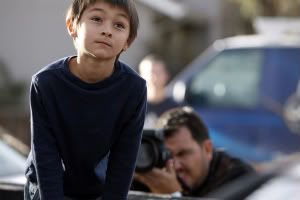Maurice Sendak is cracking me up.
from Amy Graff at sfgate:Maurice Sendak tells parents to go to hellThis Friday, October 16, the movie adaptation of Maurice Sendak's
Where the Wild Things Are opens in theaters.
The poignant 10-sentence book about an angry boy who is sent to bed without supper and sails to a magical land overrun by wild creatures has been made into a full-length feature film with a script by director Spike Jonze (recently interviewed by the Chronicle) and local boy Dave Eggers.
Ever since the media got word of the film, reporters have hounded Sendak, Eggers, and Jonze. One of the main questions reporters are asking is,
Will this film based on one of the best children's books of all-time be appropriate for children?The creative minds behind this film have seemed to dance around this question in most interviews, but Sendak freely spoke his mind for a Newsweek story, appearing in the October 19 magazine. Sendak, Jonze, and Eggers were all interviewed for the story.
Reporter: "What do you say to parents who think the Wild Things film may be too scary?"
Sendak: "I would tell them to go to hell. That's a question I will not tolerate."
Reporter: "Because kids can handle it?"
Sendak: "If they can't handle it, go home. Or wet your pants. Do whatever you like. But it's not a question that can be answered."
Jonze: "Dave, you want to field that one?"
Eggers: "The part about kids wetting their pants? Should kids wear diapers when they go to the movies? I think adults should wear diapers going to it, too. I think everyone should be prepared for any eventuality."
Sendak: "I think you're right. This concentration on kids being scared, as though we as adults can't be scared. Of course we're scared. I'm scared of watching a TV show about vampires. I can't fall asleep. It never stops. We're grown-ups; we know better, but we're afraid."
Reporter: "Why is that important in art?"
Sendak: "Because it's truth. You don't want to do something that's all terrifying. I saw the most horrendous movies that were unfit for child's eyes. So what? I managed to survive."

